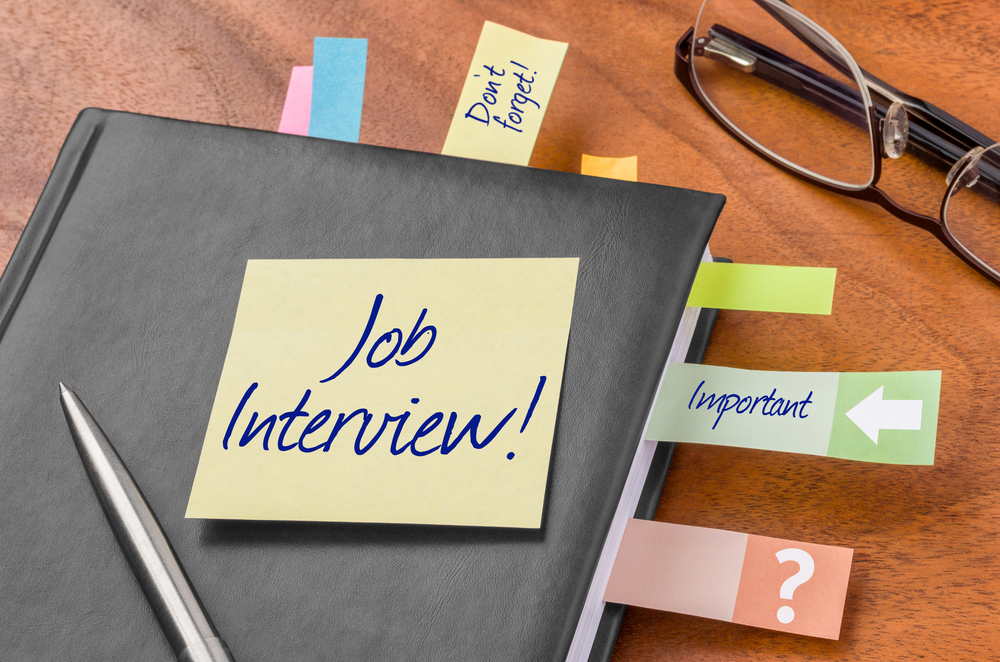Acing a Job Interview in English
Your heart is racing and your palms feel sweaty. If this is you as you anxiously wait to walk into a job interview in English, then we have some tips for you. English is the global language for business, so let’s get down to the nuts and bolts of acing a foreign language interview!
Practise Common Interview Questions
Pre-interview preparation is extremely important. Prepare your answers to possible questions, both general interview ones as well as ones specifically related to the position you’re applying for. There are plenty of online sources you can consult. Find the most relevant questions and practise answering them before the interview.
Of course it’s not possible to predict exactly what a recruitment manager will ask you. The best thing you can do is to be ready to answer the most common questions without any long, unnecessary pauses or hesitation. Doing this will help you feel more confident when you have to answer the unexpected questions that usually come up during an interview.
Exchange Greetings & Pleasantries
Remember, first impressions matter! Saying ‘good morning, how are you?’ when you enter the interview room or ‘I am pleased to meet you’ after meeting the interviewer is important. If an interviewer sneezes, it’s courteous to say ‘bless you’. If he or she says ‘have a wonderful day’, you should respond with a polite ‘thank you, you too’.
Learn the Necessary Vocabulary
Prepare at least 10 sophisticated phrases or idioms and repeat them to yourself over and over again until they come naturally to you. Use them strategically when answering the interview questions. Not only will you make more of an impression, but the interviewer will also appreciate your language proficiency.
Some companies also have phrases or expressions they use on a regular basis; it’s a great idea to research these and use them during the interview. You can usually find this information by looking at the company’s website and social media.
Needless to say, you must understand the job titles commonly used by companies, as well as the responsibilities they involve. What do acronyms such as CEO, COO, HR, and BOD stand for? Do your homework! Our workshop Jobs and Titles will be very helpful to you in this regard.
Describe Your Past and Future
Why did you leave your last job? Where do you see yourself five years from now? Your interviewer will want to know what you’ve done in the past and what you would like to do in the future. Therefore, it’s time to brush up on your grammar. Review past and future tenses and make sure you use them correctly. Saying ‘I not going to’ instead of ‘I’m not going to’ could cost you your dream job!
Focus on Professional Development
Explain to the interviewer what you’re doing to improve your business English and increase your soft skills. This is your opportunity to show that you’re focused on professional development, a valuable asset for any employee. Willingness to learn new things is a must in the business world.
Listen Before Answering
Listen to the interviewer carefully before giving an answer. Listening skills are important in any business situation. Don’t be afraid to ask for clarification if you don’t understand a question. Politely ask the interviewer to repeat or explain it. However, you can still give a good response even if you don’t fully understand the question. To do this,
focus on the parts you do understand as opposed to the parts you don’t.
Fluency vs Speed
Most people tend to speak quickly when they are nervous. Force yourself to slow down, even if you feel confident in your ability to speak quickly. Your future employer would prefer to hear you speak slowly and clearly. It’s a good way to avoid misunderstandings while also showing you’re a mindful communicator.
Be Honest
Language learners tend to either overestimate or underestimate their language skills. Do not lie about your language proficiency when asked about it. You can even consider sharing your language-learning process as an example of the skills and personal qualities you would bring to the organisation.
Pay Attention to Non-Verbal Communication
Non-verbal communication is tricky, but it’s also very important in business interviews. Be aware of your body language and the messages it conveys to the interviewer. Also, be mindful of cultural differences. For example, in American companies, it’s expected that you maintain eye contact with your interviewer. A warm smile and a firm handshake are appreciated too. However, other cultures have very different perceptions about what is considered polite behaviour. If needed, do some research and adjust your body language accordingly.
Immerse Yourself in English
Start preparing for that interview today! To improve your listening and speaking skills, listen to English songs daily, watch films without subtitles and, if possible, talk to native English speakers.
A final note: confidence matters! Approaching your interview in a confident way will significantly increase your chances of success. Now … go and impress your future boss. Good luck!
What other advice would you give to someone who wants to prepare for a job interview in English? Tell us in the comments below.
Want to boost your business English and soft skills? Our business books are here to help you!
And if you enjoyed this post, don’t keep it to yourself. Spread the word! Give this article a quick share on your favourite social media.
Practise Common Interview Questions
Pre-interview preparation is extremely important. Prepare your answers to possible questions, both general interview ones as well as ones specifically related to the position you’re applying for. There are plenty of online sources you can consult. Find the most relevant questions and practise answering them before the interview.
Of course it’s not possible to predict exactly what a recruitment manager will ask you. The best thing you can do is to be ready to answer the most common questions without any long, unnecessary pauses or hesitation. Doing this will help you feel more confident when you have to answer the unexpected questions that usually come up during an interview.
Exchange Greetings & Pleasantries
Remember, first impressions matter! Saying ‘good morning, how are you?’ when you enter the interview room or ‘I am pleased to meet you’ after meeting the interviewer is important. If an interviewer sneezes, it’s courteous to say ‘bless you’. If he or she says ‘have a wonderful day’, you should respond with a polite ‘thank you, you too’.
Learn the Necessary Vocabulary
Prepare at least 10 sophisticated phrases or idioms and repeat them to yourself over and over again until they come naturally to you. Use them strategically when answering the interview questions. Not only will you make more of an impression, but the interviewer will also appreciate your language proficiency.
Some companies also have phrases or expressions they use on a regular basis; it’s a great idea to research these and use them during the interview. You can usually find this information by looking at the company’s website and social media.
Needless to say, you must understand the job titles commonly used by companies, as well as the responsibilities they involve. What do acronyms such as CEO, COO, HR, and BOD stand for? Do your homework! Our workshop Jobs and Titles will be very helpful to you in this regard.
Describe Your Past and Future
Why did you leave your last job? Where do you see yourself five years from now? Your interviewer will want to know what you’ve done in the past and what you would like to do in the future. Therefore, it’s time to brush up on your grammar. Review past and future tenses and make sure you use them correctly. Saying ‘I not going to’ instead of ‘I’m not going to’ could cost you your dream job!
Focus on Professional Development
Explain to the interviewer what you’re doing to improve your business English and increase your soft skills. This is your opportunity to show that you’re focused on professional development, a valuable asset for any employee. Willingness to learn new things is a must in the business world.
Listen Before Answering
Listen to the interviewer carefully before giving an answer. Listening skills are important in any business situation. Don’t be afraid to ask for clarification if you don’t understand a question. Politely ask the interviewer to repeat or explain it. However, you can still give a good response even if you don’t fully understand the question. To do this,
focus on the parts you do understand as opposed to the parts you don’t.
Fluency vs Speed
Most people tend to speak quickly when they are nervous. Force yourself to slow down, even if you feel confident in your ability to speak quickly. Your future employer would prefer to hear you speak slowly and clearly. It’s a good way to avoid misunderstandings while also showing you’re a mindful communicator.
Be Honest
Language learners tend to either overestimate or underestimate their language skills. Do not lie about your language proficiency when asked about it. You can even consider sharing your language-learning process as an example of the skills and personal qualities you would bring to the organisation.
Pay Attention to Non-Verbal Communication
Non-verbal communication is tricky, but it’s also very important in business interviews. Be aware of your body language and the messages it conveys to the interviewer. Also, be mindful of cultural differences. For example, in American companies, it’s expected that you maintain eye contact with your interviewer. A warm smile and a firm handshake are appreciated too. However, other cultures have very different perceptions about what is considered polite behaviour. If needed, do some research and adjust your body language accordingly.
Immerse Yourself in English
Start preparing for that interview today! To improve your listening and speaking skills, listen to English songs daily, watch films without subtitles and, if possible, talk to native English speakers.
A final note: confidence matters! Approaching your interview in a confident way will significantly increase your chances of success. Now … go and impress your future boss. Good luck!
What other advice would you give to someone who wants to prepare for a job interview in English? Tell us in the comments below.
Want to boost your business English and soft skills? Our business books are here to help you!
And if you enjoyed this post, don’t keep it to yourself. Spread the word! Give this article a quick share on your favourite social media.




Leave a Reply
Your email address will not be published. Required fields are marked